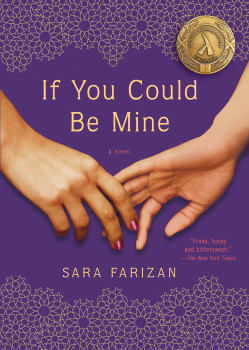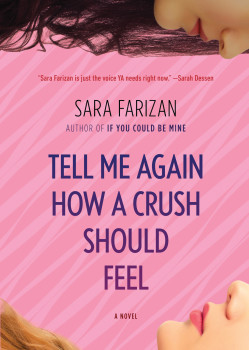Tell Me Again How a Crush Should Feel Common Sense Media
Sara Farizan's sophomore championship, Tell Me Once again How a Crush Should Feel (Algonquin), is a romance that bravely tackles complex issues such as sexuality and ethnicity, utilizing deceptively simple prose to keep the pages turning.
The protagonist, Iranian teenager Leila, falls hard and fast for the new girl at Armstead Academy. Leila struggles to come to terms with her crush, as well as her tangled thoughts about not simply whether to come out to her friends, simply how. In i centre-opening moment, after trying to hint to a friend that she might think a female teacher is hot, Leila wonders: "If the thought that I'thou gay is then across the realm of possibility for someone every bit smart and sensitive as Tess, what would everyone else at Armstead make of this information?"
Her sexuality gets even more complicated when it comes to her family unit and her Iranian culture. An Iranian family unit friend was ousted from his family unit—shunned, for lack of a better term—and Leila fears the same if she reveals her true self to her family.
There's plenty of relevant, weighty content in Farizan's informal prose. Such residual makes the novel a stiff respond to #WeNeedDiverseBooks call that went out final summertime addressing the lack of variety in literature. The motion was spearheaded, initially, after New York's inaugural BookCon announced an all-white author lineup. Author Ellen Oh rallied other writers and used the hashtag to drum up support for protagonists and writers showcasing underrepresented groups including lesbian, gay, bisexual, and transgendered minorities.
 The move built on social media, and was underscored by a Academy of Wisconsin-Madison report that showed how this upshot went beyond a single volume conference: according to the information, less than eight percent of children's books in 2013 were penned by or almost people of color. In contrast, most half of U.Southward. children hail from a minority groundwork. To its credit, the BookCon organizers listened to Oh and others and offered a console addressing multifariousness. Today, the #WeNeedDiverseBooks motility has burgeoned into a grassroots organization that has grabbed the ear of the publishing manufacture at nearly every level.
The move built on social media, and was underscored by a Academy of Wisconsin-Madison report that showed how this upshot went beyond a single volume conference: according to the information, less than eight percent of children's books in 2013 were penned by or almost people of color. In contrast, most half of U.Southward. children hail from a minority groundwork. To its credit, the BookCon organizers listened to Oh and others and offered a console addressing multifariousness. Today, the #WeNeedDiverseBooks motility has burgeoned into a grassroots organization that has grabbed the ear of the publishing manufacture at nearly every level.
Farizan'southward novel captures this cultural sea change, propelled in office by the success of her 2013 debut, If You lot Could Exist Mine (Algonquin), which likewise featured a gay Iranian protagonist. The novel received glowing praise from reviewers and won numerous awards.
Farizan'due south raw and honest portrayal of sexuality in young-adult literature is both timely and of import, though for all its cultural relevance, Tell Me Again How a Beat out Should Feel loses some of its power when the text gets too light, staying likewise close to the surface. For example, Leila tells readers that she's a pariah in her school, an outcast from the popular group, and that coming out will only add together to her freak status. But the reality seems to be that she has close friends, she's cute (at to the lowest degree two characters tell her as much), her dad is a surgeon, and she attends an university with supportive teachers. So what, precisely, erodes Leila's self conviction throughout these pages—even to the signal that she would autumn for a shallow and ultimately unstable new addition to her elite school—remains a mystery. When another character asks Leila this question later on in the book, Leila doesn't herself seem to know.
Leila's outsider condition may well be self-imposed—a response to not knowing what to do with or about her sexuality. Every bit such, Leila is a typical teen, feeling peer pressure acutely, creating walls readily. To her credit, Farizan didn't write a book virtually a gay girl—she wrote a book well-nigh a teen girl with all the angst and insecurity that naturally comes with the territory. The book is too about experiencing love for the offset time, about family, and ultimately about universal subjects to which near any reader can chronicle.
 You don't have to be gay to sympathize Leila, but you lot do want to empathise her. Then information technology can be frustrating when Farizan doesn't allow u.s. into Leila'southward caput enough. When Leila's crush asks her to become to political party later on their play wraps up (information technology's 12th Night, consummate with gender defoliation and cross dressing), Leila tells the object of her amore that, no, she tin can't become to the political party. The reader never completely understands why Leila turns downwardly her crush. This is complicated 3 pages later when Leila asks her mom if she can please attend the get-together after all. Leila's motives and her change of heart are perhaps representative of the complicated and often contradictory inner and emotional lives of teenagers. But non illuminating those convoluted idea patterns leaves the reader wanting more of Leila'south motives, more of what'south going on in her muddled listen.
You don't have to be gay to sympathize Leila, but you lot do want to empathise her. Then information technology can be frustrating when Farizan doesn't allow u.s. into Leila'southward caput enough. When Leila's crush asks her to become to political party later on their play wraps up (information technology's 12th Night, consummate with gender defoliation and cross dressing), Leila tells the object of her amore that, no, she tin can't become to the political party. The reader never completely understands why Leila turns downwardly her crush. This is complicated 3 pages later when Leila asks her mom if she can please attend the get-together after all. Leila's motives and her change of heart are perhaps representative of the complicated and often contradictory inner and emotional lives of teenagers. But non illuminating those convoluted idea patterns leaves the reader wanting more of Leila'south motives, more of what'south going on in her muddled listen.
Still, more often than non, and especially in its concluding third, the novel details precisely how a crush feels in all its messy, heart-wrenching celebrity. When it packs its near powerful punches, the book is more than merely a successful young-developed novel. It's an intersection where a work of fine art meets a cultural shift at exactly the correct moment. The vanguards of such an occurrence include Upton Sinclair revealing to the public the horror nutrient production in The Jungle, or Rachel Carson launching the environmental movement with Silent Spring. Because of these books, laws get passed. Attitudes shift. And somewhen, the culture changes.
Such alterations in the mural might not happen directly with Tell Me Over again How a Shell Should Experience. They can't, really, when character descriptions rely on "she's attractive and dresses well," and the informal prose stays too lite. But even with its flaws, this novel is certainly office of a cultural sea alter. And fifty-fifty if it wasn't, Leila's emotional dilemmas will yet resonate with anyone who'southward fabricated a questionable dating choice (and haven't we all?) regardless of sexuality, resulting in a rocky emotional path. In the end, Leila's bravery in facing her mistakes and her true identity is beautiful and triumphant. And the result is a timely and poignant novel.
Editor'south Note: Cheque out We Demand Diverse Books and help support this organization's of import campaign, which is going on now until December 10th.

mcnaughtonsough1988.blogspot.com
Source: https://fictionwritersreview.com/review/tell-me-again-how-a-crush-should-feel-by-sara-farizan/
0 Response to "Tell Me Again How a Crush Should Feel Common Sense Media"
Post a Comment